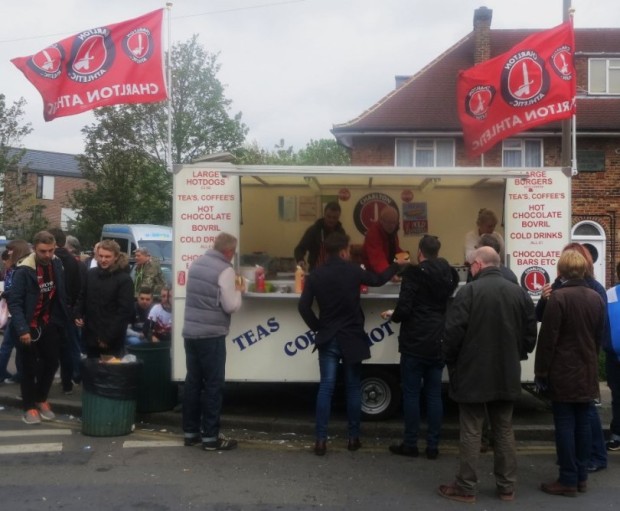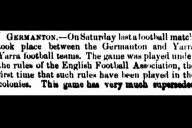It is a tall trophy and it was cradled by the suited man as he descended some stairs, guided by a suited woman carrying a walkie-talkie. On to the pitch they went, surrounded by security guards dressed in broad and thick plastic jackets. The security guards were silent and unsmiling. The trophy-carrier all formal officialness. And behind them, thousands cheered. Also, to their left, on the western flank of The Valley, the away supporters too were jubilant, rowdy, cock-a-hoop. Bournemouth had won The Championship. Thanks to a 90th minute equaliser from Sheffield Wednesday against Watford, Bournemouth finished on top. The Bournemouth fans celebrated Wednesday’s goal louder than their own three goals, and then, they were louder once more upon it becoming official that they had finished on top. The team played on for a minute or so, before time too was blown at The Valley. And as the players congregated in the middle and at the Away End, the Sky Bet Championship dais was carried forth by a couple of roadies, wearing black hoodies and black jeans. Upon this platform the team shall dance.
***
Football games leave long traces. The game’s 90 minutes, plus whatever added time, gives a poor indication of the amount of time it takes to attend and enjoy a game. The acts of going to a game, in contrast to that of watching a game on television, are as good as totally different; one can’t replace the other. Attending a game might be able to be broken up into the following stages: departure from home; use of public transport (and the intermittent changes of vehicle type, each having their own nuances and atmosphere); the walk from the nearest train station or bus stop to the ground; outside the ground; the waiting inside the ground; watching of the first-half; half-time; second-half; farewell applause to players; drinks at nearby pub; the trek home. The experience of watching a game on the TV (mobile device, whatever) is decontextualised from these acts. I was in London for two days, one spent at a conference, for the other day, I was in search of football. I was not too bothered by division or team: I wanted a game that I could watch before my flight. In the case of not being able to find a game, I had visiting the old Highbury ground and the museums of local clubs as a back-up. But, I got lucky. Not only was Charlton Athletic playing on Saturday 2nd May, but, they were also playing the new glamour team, AFC Bournemouth, who had a few days earlier confirmed their elevation to the English Premier League.
I went to the game, with only the stock of minor knowledge: a few perusals of Charlton Athletic’s website and some unofficial media. I signed up to follow their Twitter account. AFC Bournemouth, of course, were in the news and in The Guardian: a club transformed, a club on the rise, a club with a charismatic CEO, a Russian investor of whom no one knows too much. I wanted to support Charlton Athletic, but, the story was of Bournemouth’s rise. I had been in touch with Rick Everitt, editor of the Charlton fanzine, Voice of the Valley, and he told me that I would be able to get a copy of the fanzine out the front of the stadium; he told me too, that their own museum wouldn’t be open on the match day. The Charlton Athletic salesperson had sold me the ticket after a few questions: have you been to any other Charlton games this year? Where will you be coming from? Which section would you like to sit in? I had feared the game was going to sell-out thanks to Bournemouth’s impending promotion, and bought my ticket a few days before departure.
***
I take the tube from Archer to London Bridge, change to the Jubilee line, get off at North Greenwich and then take the 486 to Charlton Station. It is a journey from Arsenal-country to Charlton-territory. London, a home of modern football, has some 13 professional clubs. Charlton’s main rivals are Kevin “the most-hated player in English football” Muscat’s ex-club Millwall and skipper Mile Jedinak’s Crystal “Liverpool-title-hope’s-destroying” Palace. Education on the club’s rivalries comes easily. On the 486 bus to the ground, I hear a 20-something female fan explaining to a couple of Bournemouth fans, “Yup, don’t like them [Millwall]. They wouldn’t sell us tickets.” Millwall’s fans are infamously violent, the legend has it, but, this is not the reason mentioned. Voice of the Valley fanzine also reinforces the loathing of Millwall by repeating that Charlton Athletic’s difficulties in beating Millwall is one of the ongoing themes of their recent seasons. Perhaps at least they can take some satisfaction in seeing Millwall being relegated to League One. The conflict with Crystal Palace stems largely from the groundsharing of Crystal Palace’s Selhurst Park from the 1985-86 season until the 1993-94 season. One of the paraphernalia shops out the front of the stadium sells a ‘Keep Calm and Hate Palace’ t-shirt.
The tube is quiet on this Saturday morning and it feels a little early to be going to the football. I leave Archer, after all, at 10:15. The journey takes an hour and I want some time at the stadium and outside of it to hang about and watch what people do while waiting for the game to start. The tube of course is quiet except for the announcements of stations and where to get off; the stations are so close together that the metro has barely left a station before the next one is almost upon us. After getting on the Jubilee Line, a man sits with his father; both wearing Bournemouth scarves. I trust we’re following the same route. They are silent and a little hunched over. Their expressions don’t indicate the relief of fans having seen their team be promoted. They look bored and depressed. This state reminds me once more of Nick Hornby’s watching of Arsenal in the 1980s; being at a game created a kind of space in which to brood, mull, and ponder. I read my book by Jonathan Wilson on the evolution of football tactics, partly out of interest and partly out of a means to distract myself from the claustrophobia of the tube. And then I interrupt the younger man’s silence and check that it is indeed the 486 bus to get to the game. I’m testing to see whether or not he can be engaged in chit-chat about Bournemouth and the game.
From the bus-stop, one walks up a narrow road, past a pub, supermarket and take-away before turning left, down towards The Valley. Football has taken over the streets. Supporters of both teams intermingle: there is no clear, organised separation of fans. But, police on horseback wait on corners and at intersections. I ask one Bournemouth fan, “if the club goes straight back down after one year in the Premier League, will it have been worth it?” He replies, “we get 120 million pounds. So, as long as we don’t spend too much on players, but instead invest in facilities, then, yeah, it will be.” He lives near Bournemouth and is a season ticket holder; he has mates to meet at the game. Another man, he was with is a London-based Bournemouth fan, and he too goes off to meet his friends; I thought they were going together – having mistaken their convivial conversation for a longer friendship. I buy a Bournemouth “We are going up” badge and put it in my wallet, out of respect for being in the Charlton section of the stadium. Men arrive in groups of five or so. I hear a woman with a North American accent at the ticket counter. As had been suggested to me the day before at a conference on Sport and Prejudice, the assembling crowd is largely white and male. A presenter from Kick It Out at the conference provided statistics on the overwhelming amount of racist abuse that is part of the crowd and virtual culture. The reports of racist abuse rarely lead to charges, let alone convictions.
***
The game begins and the sun is strong and the Bournemouth fans are in full voice. They are quickly given further reasons to maintain their shouting, cheering and chanting. The crowd chant without any apparent orchestration: there is no capo and no one is carrying megaphone. After 11 minutes Bournemouth are up two goals to nil. “This could get embarrassing” says someone behind me. “Is there any danger of a tackle being laid?” “You’re kidding me, aren’t you?” There are indeed some proper Charlton fans within this lower-west section. I had heard Spanish, Italian and French all-around; and the couple to my right were also at their first game. Perhaps Charlton had reserved a small section of the west stand for football tourists. And because of the relative ease in getting a ticket (i.e. not requiring a club card, as is the practice in The Netherlands), some Bournemouth fans have infiltrated the “Charlton Supporters Only” section. They make the mistake of celebrating too gleefully. And thanks to the handy work of CCTV cameras, they are soon escorted by hefty security men. Some make small and polite protests, others resist passively. The Bournemouth fans in the designated Bournemouth section chant their disapproval in vain. The Bournemouth fans’ celebrations were a little on the provocative side and thus their removal is hardly surprising. Tickets are printed with the customer’s name on it; thus giving another layer of security and justification for getting rid of any supposedly illegitimate fan.
The first half ends with little fanfare. Half-time is used to acknowledge the achievements of the U19 and U21 teams that have recently won some trophies. The Charlton fans clap enthusiastically. There is a half-time address from the coach, Guy Luzon, who thanks the fans for their support through the season. The consensus is that this season has neither been as bad nor as good as it could have been; a sore-point, being once again, the loss to Millwall. The game resumes and it is merely an act of counting down the minutes until the end; Bournemouth up to the Premier League, Charlton a beleaguered defeat. And then, a goal late on, around the 80th minute. Bournemouth doesn’t humiliate Charlton, as feared early on, but nor do they get back into the game. The moment of ecstasy comes though when news arrives that Sheffield Wednesday have equalised against Watford, meaning Bournemouth are Champions. There is only a couple of minutes before the equaliser and the end of the game; and the cheering is of shocked joy; a mass explosion of shouting. The bench run on to the pitch at the final whistle; Charlton players squat in fatigue. SkyBet blue banners stating, “Champions 2014-15” are dished out to the victorious players, who make their way to their fans after a romp on the pitch. Arm in arm and they enjoy the celebrations of fat and muscular men who are swinging their t-shirts around their bald craniums. Inflatable champagne bottles and bananas bob up and down in the moshing crowd.
I see Bournemouth chairman Jeff Mostyn walk onto the pitch and take the trophy from the suited man. The singing of the Bournemouth fans who have now well and truly taken over the lower-west section is well and truly of the drunk and delirious manner. “Oh my days,” says one fan as he fails to latch on to Queen’s We are the Champions. A father and son hold aloft a Bournemouth scarf. The stand slowly empties of the non-hardcore Bournemouth fans. Charlton’s fans had been seen dribbling homeward bound with some twenty minutes to play. They had seen enough. I too have seen enough of Bournemouth’s ecstasy, and to be honest, I don’t comprehend it that much. I’ve just come on board out of curiosity over the past week. They are considered a Cinderella story, but, they too have a cashed-up owner. It is the story of their coach, Eddie Howe, that I like. An ex-player who has taken them to the Promised Land and who with his assistants have bought players wisely. Charlton are sporting in their congratulations of Bournemouth; I sense no resentment at their success. Just a mild disappointment in their own failure to have challenged for Premier League promotion.
***
The sport is about winning; do it often enough and some silverware comes your way. Fill a museum with them, polish them and catalogue them and make your fans pay money to see them. And on the day the thing is won it is manhandled, kissed, licked, drunk from and groped. On parades these delicate masterpieces are dropped from double-decker buses to test their metal, even if drunkenly and inadvertently. This trophy was taken for a tour-along the Bournemouth coast; it enjoyed the cool sea-breeze on a sunny afternoon in front of a not-too-small-turnout. Have trophy; the fans arrive. Promotion means money and almost certainly, more frequent defeats for the champions of the Championship. But, the goals, draws and hopefully not-too-rare wins will have a greater currency. Charlton Athletic was sporting on this day though, telling them that “the next time we play against one another, we’ll be up there too”. The fans behind me didn’t seem too optimistic. Instead, the struggle for Charlton, at least in the short term, is to maintain the club’s connection to its specifically local, SE7 community.
Andy Fuller writes on football and urban culture. He lives in Leiden, The Netherlands. His website is readingsideways.net
















